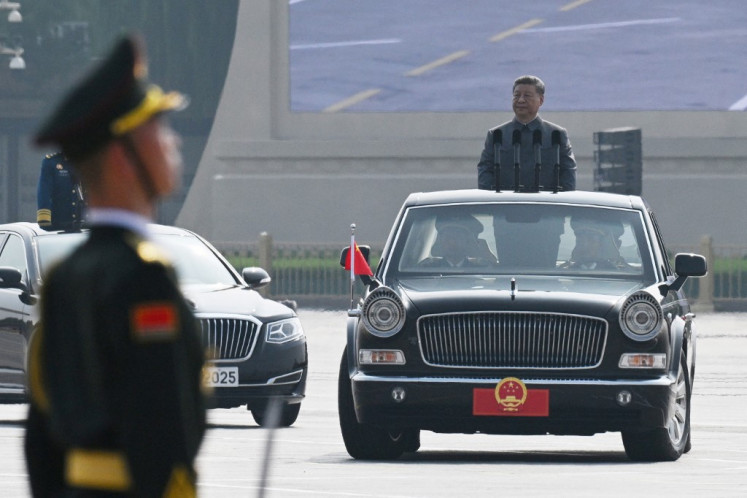Popular Reads
Top Results
Can't find what you're looking for?
View all search resultsPopular Reads
Top Results
Can't find what you're looking for?
View all search resultsGovt renews TV permits, but problems persist
Change text size
Gift Premium Articles
to Anyone
T
here were audible sighs of relief in the newsroom followed by a congratulatory mood across WhatsApp groups when just a few hours before midnight on Friday the 14th of October, the Communications and Information Ministry renewed the broadcasting permits of 10 TV stations, assuring the next decade of the industry’s existence in Indonesia.
It was tough — rumor has it the House of Representatives was close to rejecting the renewal after three hearings. It spread fear that the industry would come to a standstill, leaving tens of thousands of people jobless and a business valued at billions of US dollars stranded.
Even a change.org petition campaigned for public rejection, increasing pressure on the already tight process. Hitherto, no authorities offered an official statement as to what really delayed the decision up to the last few days before the Oct. 18 deadline.
But concerns were evident. One that earned several mentions during hearings was over TV stations and their role seen as a serving tool for their owners.
Granted, partiality to ideologies and political leanings is nothing but normal these days in the media business. Even in the US, two of the biggest TV stations are known to take sides: FOX leans to right wing politics while MSNBC leans to the left.
TV stations and their political backing in Indonesia, however, is nothing sort of similar. The most blatant ones saw owners cum heads of political parties freely using their stations to campaign for political gain. Several stations could give this preferential treatment on a daily basis ad nauseam.
In an apparent effort to remedy the circumstances, leadership of the Indonesian Broadcasting Commission (KPI) mandated TV stations to sign over a list of commitments intended to separate interest of the owners from their stations.
To ensure that, the KPI declared an annual evaluation in a bid to “uphold the law”, while TV stations are required to “guard the (media’s) independence and balance”, particularly over an election process.
Understandably, skeptics have expressed doubt: relentless coverage for the owner’s political benefit is clearly against the better ethics of journalism — if the broadcasting regulator failed to stop them over that violation then, what power does it possess to prevent such action from recurring?
There are other recurrent vices in need of immediate KPI intervention. Habit to blur “inappropriate” footage of a woman’s body is one. Taking a stand against airing hate speech and violence — especially crucial in vicious local elections — is another.
It’s thus heartening to hear that the KPI has pledged a different approach toward policing the airwaves: to prioritize constructive discussion over sending warning letters. The latter policy has resulted in thousands of official warning letters being sent to TV stations along the decade, with little apparent efficacy.
To be fair, the industry is not in its strongest form. It’s important to note that journalism is always front and center with Indonesia’s struggle to economic crisis, sectarian conflict and political upheavals and TV stations have helped provide concordant news to every household in the country.
As the country grappled with endless cases of terrorism, corruption and natural disaster, along with print and online media, TV has shown dedication and hard work to present these stories to their audience. Nonetheless a question such as “what legacy has the TV industry left behind the last 10 years” is likely to point to scanty achievement.
The abuse of public airwaves for political gain has created a divisive audience and often times growing distrust in news media.
And while the industry has thrived and attracted both billions of dollars in investment and tens of thousands of jobs, its service in entertainment remains problematic.
After the widespread influence of Latin American soap operas in the 1990s, Indonesian TV screens were later filled with Korean, Turkish or Indian film serials. Meanwhile, local soap operas (popularly known as sinetron) attracted neither talent nor innovation and steadily lost captive fans. In a global culture that created cult followers for ingenious series’ like Game of Thrones in the US or Sherlock in the UK, the Indonesian TV industry has stagnated for many years.
Even neighboring Malaysia fares somewhat better: its original creation of the Boboiboy and Upin-Ipin cartoons have become a television staple for Indonesian children over the last several years. The Japanese magical cat Doraemon and the US’ Dora the Explorer continue to entertain and influence children everywhere after decades, but Indonesia’s long legendary series such as Si Unyil has stopped performing for more than two decades now.
Will this void be filled in the next 10 years?
TV around the globe is losing audiences in large numbers — the ever expanding social media and information technology has given alternative choices, otherwise absent until about five years ago.
Amid the rise of living standards, more audiences will migrate to pay TV as they demand more sophistication and quality broadcast.
It’s in the industry’s best interest to respond to these concerns with better outcomes. Or else, there will be little justification as to why the permits need to be renewed.
The writer is a standards and practices specialist for CNN Indonesia. The views expressed are her own.










